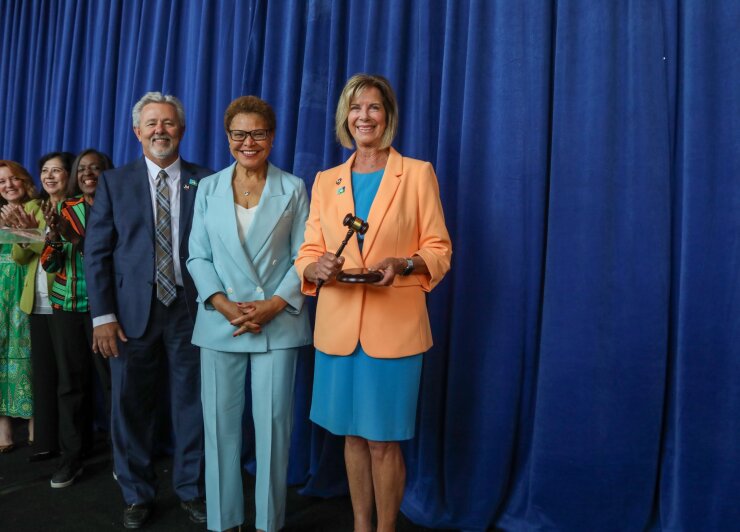The looming 2028 Olympics and the specter of crime took center stage at the Los Angeles County Metropolitan Transportation Authority's state of the agency event this week.
Los Angeles Mayor Karen Bass handed off the gavel and her title as Metro chair to Los Angeles County Supervisor Janice Hahn during Wednesday's event held at Union Station in downtown Los Angeles. The lead role is held for one year by members of the board on a rotating basis.
"My top priority as the new chair of Metro is the safety of our riders and our employees," Hahn said.

A desire to respond to reduce crime on the massive system already compelled the board on June 28 to create its own police department and to increase the number of ambassadors along the system.
LA Metro plans, builds and operates public transportation and highway projects in a 1,433-square-mile region with more than 10 million residents.
It has been expediting transit projects in preparation for hosting the Olympics.
At this week's event, it also celebrated funding to extend the A light rail line, adding its first line into San Bernardino County, after the California State Transportation Agency released
The funding is the first wave of the $5.1 billion multi-year transit recovery package allocated in the 2023-24 budget package signed by Newsom ahead of the start of the July 1 fiscal year. The funding was distributed to 22 agencies with amounts based on regional population.
Metro's new transit police department will have 386 law enforcement officers deployed daily in the field — the same number it now has through its multi-agency contract with the county sheriff department and Los Angeles Police Department — but they will work directly for Metro. It will increase the number of ambassadors, homeless outreach workers and crisis intervention staff. They also budgeted $5 million for public safety infrastructure improvements at transit stations.
The new police department is expected to cost $192.5 million per year, slightly less than the $194 million currently spent on the multi-agency contract. It will use the savings to implement the new department. It's expected to take five years to completely switch over, Hahn said.
"This action will make Metro safer by transforming the public safety system through a new model that fits the unique needs of our transit system," Bass said. "The Metro Board of Directors' top priority is keeping our riders and operators safe."
In addition to the funding from the state for the A Line, the Los Angeles region also secured nearly $900 million in federal funding from the Bipartisan Infrastructure Law and the fiscal year 2024 transportation spending law in March to expand the Metro rail system and better connect communities ahead of the 2028 Olympic and Paralympic Games.
Of that sum, LA Metro received $709 million to spend on the East San Fernando Valley Light Rail Transit Project and the D Line subway extension. The region also received $160 million in federal grant funding for street and transit infrastructure, traffic safety and to improve connections between neighborhoods.
The system reported its 17th month of consecutive months of year-over-year ridership with a 10.8% increase in total ridership in April compared to April 2023, for a total of 26.2 million boardings.
Average weekday ridership in April 2024 was still down 20% compared to April 2019, the last April before the pandemic.





